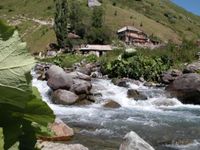The Statement of the Press service of the Ministry of Foreign Affairs of the Republic of South Ossetia
On August 8, 2012 on the initiative of the Ministry of Foreign Affairs a round table "Iron Nykhas" was held in Tskhinval. Representatives of the Ossetian communities in Belgium, the Netherlands, the regions of the Russian Federation, Syria, Turkey, France, representatives of South Ossetia public organizations and well-known representatives of Ossetian science attended the discussions. The events of August 2008 in retrospect of the Ossetian-Georgian interrelations were discussed at the round table. Besides, the speakers discussed the role of the Diaspora in the country's life and the problems of the Diaspora. The round table discussions summed up with the statement adopted.
Statement adopted by the round table participants.
"The events of August 2008 in retrospect of the Ossetian-Georgian interrelations"
Tskhinval, August 8, 2012
Throughout the entire epochs Georgian rulers sought to capture the ancient Ossetian lands and annihilate their Ossetian neighbors in order to expand the borders of Georgia. The genocide of the Ossetian people in 1920, genocide of 1989-1992, armed invasion in 2004 left open wounds in the memory of the Ossetian people. With the proclamation of the independence of Georgia, each new government started its military actions against South Ossetia. Each attack of Georgian troops against South Ossetia featured brutality and barbaric cruelty.
Four years ago, a large-scale military aggression and genocide of Ossetians in August 2008 demonstrated that even in the third millennium, the Georgian leaders continue to think in terms of the wild Middle Ages, referring to the old barbaric methods in order to achieve their goals. Both in 2004 and in 2008 the Georgian military adventure took place during the Olympic Games. Having started the war at a time when the whole world was watching the opening of the XXIX Olympic Games, Georgia expected to have time to carry out the massacre of South Ossetia and put the international community with a fait accompli before anyone had time to react and take action, but the Georgian leaders made a mistake in their calculations.
Amazingly, the attack on South Ossetia was celebrated in Georgia with truly national glee: on the night of 7 to 8 August 2008, when under the fire of Georgian artillery hundreds of people were dying in Tskhinval mass festivities with music and dancing were held in Tbilisi.
The Russian Federation not only came to the rescue and saved the people of South Ossetia from destruction, but also recognized the state independence of the Republic of South Ossetia trying to resolve the issue of security and peace in the South Caucasus region. The Ossetian people will forever be grateful to the Russian Federation, to all Russians, who unanimously supported South Ossetia. The participants also expressed their deep thankfulness to other countries which have recognized the independence of South Ossetia and thus they have made a significant contribution to the process of peace strengthening.
However, they continue to dream of revenge and the seizure of foreign lands in Tbilisi. Increasing stocks of weapons and training new assault teams, Georgia tries to evade responsibility for the crimes committed against peace and humanity. Tbilisi regime is carrying out a massive propaganda campaign denying the obvious facts and replicating deceitful fabrications trying to convince inexperienced audience that Georgia is the victim of aggression. Meanwhile Georgia refuses to sign legally binding peace agreements guaranteeing non-aggression and non-use of force against South Ossetia.
Being the aggressor, and violating Olympic principles, Georgia is trying to get even with Russia for the recognition of South Ossetia and Abkhazia disrupting the Sochi Olympics, selfishly taking advantage of the Circassian people historical tragedy. Moreover, they forget in Tbilisi about repeated acts of ethnic cleansing and genocide against Ossetians, when Georgian forces and militants killed and brutally tortured thousands of Ossetians, regardless of sex or age.
Trying to whitewash itself, Georgia positions itself as a beacon of democracy and upholder of the rights of the peoples of the North Caucasus, addressing them the broadcasting of its propaganda media resources such as PIC TV. But behind the smart shop windows of Tbilisi one can clearly see visible features of a totalitarian nationalist regime that has just made up, but has not changed its essence. This real face of Georgian politics is reflected in the eyes of the people of South Ossetia, who have lost their loved ones, not only in August 2008, but also in other periods of Ossetia history, which Tbilisi is making people forget.
Taking into account the above facts indicating of the grounded possibility of a repetition of aggression from Georgia side, noting that Georgia launched military attacks against South Ossetia many times and systematically and each time they were accompanied by atrocities and crimes against humanity and acts of genocide,
The roundtable participants call on the international community
• condemn openly and officially the armed aggression of Georgia against South Ossetia in August 2008, which led to numerous casualties and sufferings;
• take into account that the silence of the aggression and the encouragement of the Georgian authorities in their anti-Russian hysteria leads to a new upsurge of revanchist sentiments that can turn into next armed aggression against South Ossetia;
• Use every opportunity to find and return Ossetians kidnapped by Georgian police and reported missing;
• impose an embargo on the supply of any weapons and munitions to Georgia;
• use all the possibilities to influence on Tbilisi, in order to make Georgia sign a legally binding agreement on non-use of force against South Ossetia;
• recognize the Republic of South Ossetia as an independent state.
Tskhinval, August 8, 2012

